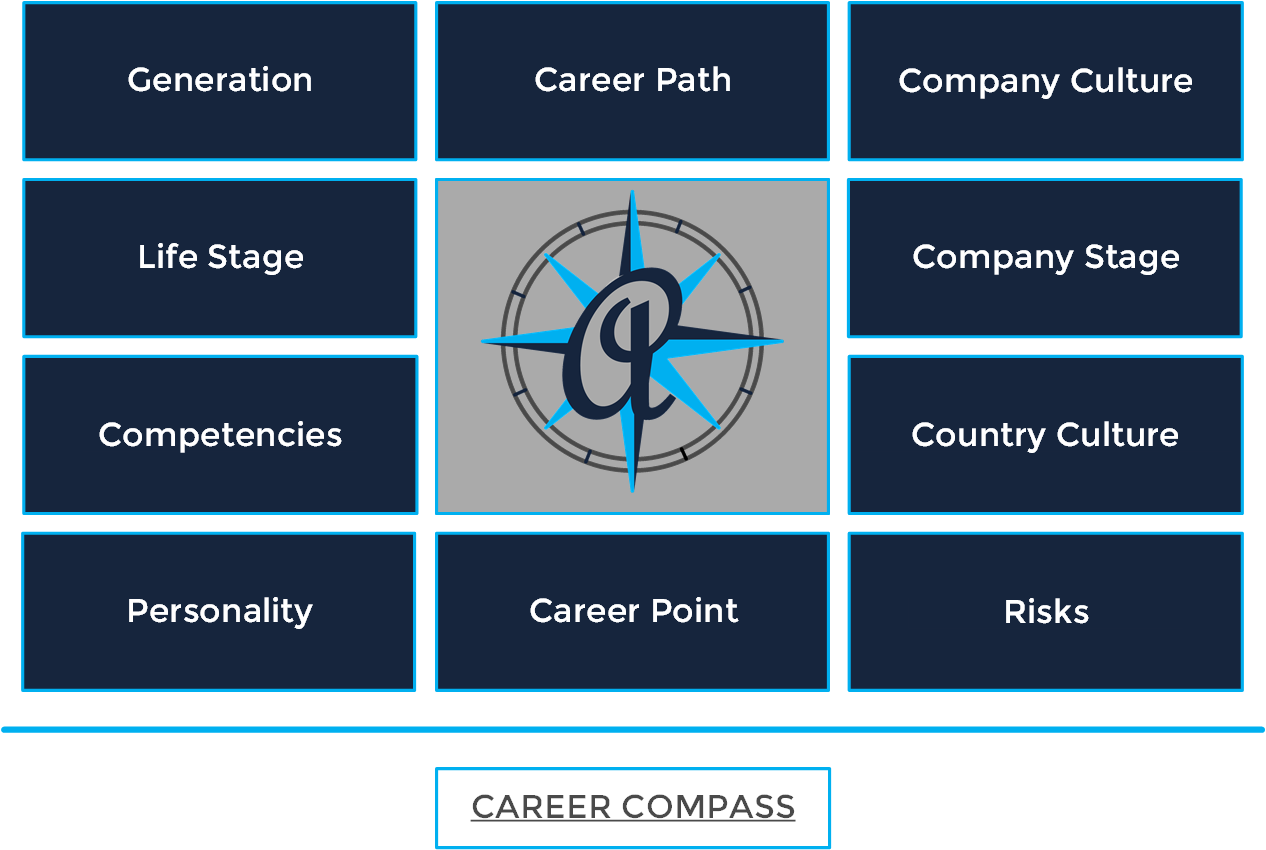Career Compass

The most important career influences
Which generation do you come from?
There is generational diversity in the workplace. You come together with people there with whom you would probably have no contact in your private life. The clash of generations offers opportunities and risks at the same time. Which generation do you belong to? Can you quantify this? After all, the boundaries between generations are usually floating.
In which phase of life are you?
In the life stage model of H. v. Sassen and B. Lievegoed and A. Graf and E. Regent, a distinction is made between the introduction phase, the growth phase, the maturity phase and the saturation phase. Clear age stages are assigned to these. In today's working world, however, this strict classification is only partially correct. Other necessary reasons for differentiation can be topics such as unemployment, starting a family, building a house, separation, illness, occupational disability, death of close relatives, etc.
What personality do you have?
Your personality determines to a large extent how you will manage in a volatile working world. But how can you determine it? Personality tests come in a very large number and in very different types. For each of these tests, there are pros and cons - a right and a wrong. In my professional life, I have encountered many of these tests. Therefore, I know that it is not the test itself that counts, but the honest reflection of the respective results. If this is done consistently, then one arrives at the same result for almost all tests.
What are your competencies?
As with personality tests, there are also numerous procedures for determining competence profiles. Competencies can be divided into six main areas which include a number of sub-areas. Taken all together, this then makes up the activity and action competence of a person. The six main areas of typical competence are as follows: Social competence, personal competence, methodological competence, professional competence, learning competence, communication competence.
What risks do you face?
At the beginning of this article, we briefly touched on the opportunities and risks of generational diversity. However, the working environment often entails further risks, such as overestimation of oneself, subjectivity, conflicts of interest, loneliness, overstrain and boreout.
In what phase is your company?
The growth model based on the explanations of Larry E. Greiner differentiates 6 development phases of the organizational dynamics and derives change requirements from them. For this purpose, potential crises are also assigned to the individual phases of growth, which indicate a necessary change in the growth strategy. The individual phases are: Growth through creativity, growth through leadership, growth through delegation, growth through coordination, growth through cooperation as well as growth through networking.
What kind of corporate culture is practiced?
Just as different countries have different cultures with different views, customs and values, companies also have values and norms that are reflected in a corporate culture. The corporate culture thus shapes how employees see themselves and how they act. It thus has a significant influence on the way the company functions and thus also on its economic success. In principle, the following corporate cultures can be distinguished: Clan culture (collaboration), adhocracy culture (keativity), hierarchy culture (control), market culture (competition).
What is the country culture that shapes you?
You are significantly influenced by your environment. This includes the influence of your family and friends. The culture of the country in which you grew up also plays an important role. In order to make culture more objectively tangible, various approaches aim to capture the underlying
economic sphere: on the one hand, the classic cultural dimensions of Hofstede (1980) and on the other hand
the GLOBE study (House et al., 2004). These attempt to describe culture on the basis of various dimensions. These include power distance, uncertainty avoidance, individualism / collectivism, masculinity / femininity, long-term / short-term orientation.
At what point in your career are you?
Every career has its phases - the transition from one to the next is always marked by a career step. As a rule, this next step occurs due to a longer company affiliation and / or a demonstrated increase in performance. In our volatile working world, however, many years of service to the company are not always a given. Therefore, you should be all the more aware of your own career point and check if you have already surrendered. You may encounter the following points in your career: Company entry, first disillusionment, rise, peak, decline / stagnation, turnaround, new rise, company exit.
What career path are you following?
The classic management career, in which you climb up the hierarchy over the years, has long since been expanded to include other career models (project career, specialist career). However, demographic developments, technological change,
globalization and changing values will continue to change the future model for careers. Flexible models will be used more and more. This will significantly reduce the number of management positions and thus traditional career options.
